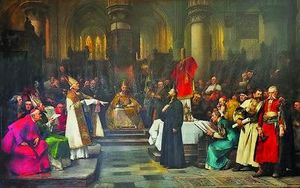John Newton persuaded William Wilberforce to stay an MP – thank God!
by Peter Barnes
Imagine that a gifted young man, able to think on his feet and speak for three or four hours if need be, were to profess faith in Christ and ask for advice as to what he should do with his life.
Today almost any evangelical minister would be quick to encourage such a man to consider entering the ministry. First the Metro or MTS programme, then theological college, then a lifetime of holding forth in pulpits and at conferences.
Not so, however, when William Wilberforce visited St Mary’s Church in London on 4 December 1785, and confessed in a note to ‘ten thousand doubts’ about himself.
Polished speaker
The rector was the converted slave trader, John Newton, who had come to know God’s amazing grace. Newton read Wilberforce’s note, and set up a meeting between the two men on the following Wednesday (7 December).
Wilberforce had emerged from a university career in Cambridge, where he had played cards rather than attended lectures. In 1780 he stood successfully for Hull, and so became a member of the British House of Commons.
Yet he was struck by what he called the ‘shapeless idleness’ of his past, and was inching his way towards saving faith in Christ. A polished speaker, armed with a talent for devastating sarcasm, Wilberforce was well suited to a life which revolved around public speaking.
The great change
Wilberforce called conversion ‘the great change’. For him it came through the conversation of Isaac Milner (the evangelical tutor from Queen’s College, Cambridge) and reading Philip Doddridge’s book
Therise and progress of religion in the soul— together with the Bible.
By 1787 Wilberforce was clear concerning his evangelical convictions and wrote, ‘God Almighty has set before me two great objects, the suppression of the Slave Trade and the Reformation of Manners’. By ‘manners’ he meant what we would call ‘morals’.
Until Newton’s death more than 20 years later in 1807, ‘the old African blasphemer’ (as Newton used to call himself) often advised the eloquent young politician on spiritual matters.
Newton was never keen to urge Wilberforce to enter the ministry. In 1786 he wrote of him, ‘I hope the Lord will make him a blessing both as a Christian and a statesman. How seldom do these characters coincide!’ Ever the optimist, Newton added, ‘they are not incompatible’.
A full-time ministry
In 1796 Newton again advised Wilberforce to remain in politics: ‘I believe you are the Lord’s servant, and are in the post which he has assigned you; and though it appears to me more arduous, and requiring more self-denial than my own, I know that he who has called you to it can afford you strength according to your day’.
Newton never fell for the line that the only possible avenue of Christian service was so-called ‘full-time ministry’. All Christians are called to full-time ministry in their respective callings.
So Wilberforce pressed on in the House of Commons. Each year he would argue the case for the abolition of the slave trade, and each year he would be defeated. Finally, in 1807 the Abolition of the Slave Trade Act was passed, and the House of Commons broke out with three
hurrahsfor Wilberforce — quite an unusual display of enthusiasm and affection for politicians.
Finally, in 1833 when Wilberforce himself was long retired and near death, Parliament abolished slavery itself.
A man of principle
Wilberforce was an extraordinary man. He thought that what was needed in politics was not more talent but ‘resolute integrity’.
Was Newton right to steer Wilberforce away from the pulpit, and keep him in the hurly burly of the world of politics? It would seem so. As Wilberforce himself put it: ‘A man who acts from the principles I profess, reflects that he is to give an account of his political conduct at the Judgment seat of Christ’.
The greatest need in the Western world today may not be more preachers but more Christians of true salt and light — who can operate in whatever sphere of service God has placed them.
This article was first published in
Australian Presbyterian and is reproduced by their kind permission.











